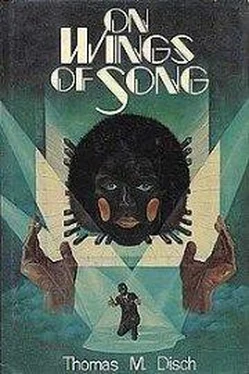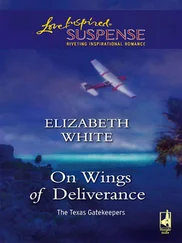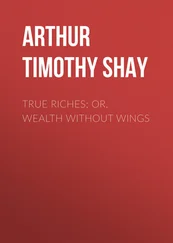Like most well-seasoned teachers, Mrs. Norberg was a confirmed monologuist, and so Boadicea was not called upon every day to speak up for reason and sanity. Penance enough to have to be an audience to the Iceberg’s rambling reminiscences of her term in Congress (it was her special pride and unique distinction to have been present at every vote taken in those two years). These would shift, by the freest of associations, into (for instance) a cutesy-poo anecdote about the dear sweet squirrels in her back yard — Silverface, Tom-Boy, and Mittens, each of them a little philosopher-in-the-rough — and these whimseys would metamorphose, by imperceptible degrees, into diatribes against the F.D.A., the bête noir of the Farm Belt. All this — the memorabilia, the whimseys, the denunciations — would be set forth with an air of winking complicity, for it was the Iceberg’s underlying assumption that her students were sensible to their good fortune in having been assigned to her Social Studies class and not that of the wishy-washy liberal Mr. Cox.
Listening to these monologues and battering her wits against the woman’s impassive, impervious authority, Boadicea came to hate Mrs. Norberg with a hatred that would leave her, by the hour’s end, trembling with impotent fury. Literally trembling. Sheerly from a sense of self-preservation, she took to cutting classes, even though there was no way, with the bus drivers posted at the doors, to leave the building. She would lock herself inside a toilet and sit cross-legged on the stool, working calculus problems. She became openly sarcastic in class, and sneered when she was sneered at. She made a point, whenever a soliloquy commenced, of turning away from the Iceberg and staring out the window, though there was nothing to be seen but sky and clouds and the slow curve of three suspended wires. Mrs. Norberg made no other response to these provocations than to move Boadicea to the front row, where, if Boadicea chose to divert her gaze, she would simply interpose herself between the viewer and the view.
It was there, in the front row seat next to his, that Boadicea recognized Daniel Weinreb. They had been together in the class for two months without her making the connection. Not that the back of his head (which was mostly all she’d seen of him till the move to the front) was so very distinctive. Also, he’d changed his appearance since she’d fallen, briefly and platonically, in love with him at the Elmore Roller-Rink Roadhouse: shorter hair, the moustache gone, the high spirits folded away, and an inert, affectless fortitude in their place. Except to answer the roll-call or shuffle his feet at a question directly addressed to him, he never spoke in class, and just as his words never betrayed his thoughts, his face never betrayed his feelings.
Boadicea was certain, however, that they were not greatly unlike her own. He hated the Iceberg as fervently as she did; he must — or how could he dance so well? Perhaps as a syllogism this left something to be desired, and Boadicea didn’t rest content with an a priori conviction. She began to collect evidences — glints and flashes of the suspected smoldering fires.
The first thing she discovered was that she was not alone in studying Daniel so closely. Mrs. Norberg herself demonstrated a curiosity altogether out of proportion to Daniel’s classroom contributions. Often when another student would be speaking her eyes would turn to Daniel, and at the militant moment when she would cut loose from classroom protocols and really testify for the gospel of the A.S.R.P., it was toward Daniel these goads were directed, despite the fact that it would be Boadicea, if anyone, who would rise to the bait and argue.
At last, however, toward the end of the second six-week period, Mrs. Norberg threw out a challenge that Daniel did not turn away from. There had been a story in the news, recently, that had very much exercised the indignation of undergoders. Bud Scully, a farm manger for the Northrup Corp. farm outside LuVerne, had undertaken, on his own initiative, to do what it was no longer permitted the State of Iowa to do: he’d been jamming radio broadcasts originating in Minnesota. The stations had brought suit against him, and he was enjoined to desist. When he refused, on grounds of conscience and continued his private crusade, he was sent to prison. Undergoders were up in arms. Mrs. Norberg, who, to do her credit, tried to resist the passions of the passing hour (she never, for instance, went beyond Watergate in her American History class) was swept away. She devoted a week of the class’s time to an in-depth consideration of John Brown. She read aloud Thoreau’s essay on civil disobedience. She played a recording of the hymn of “John Brown’s Body,” standing over the tape recorder warily and jerking her head up and down in time to the music. When the hymn was over, with tears in her eyes (a quite inadvertent testimony to the power of music), she told how she had visited the park right here in Iowa where John Brown had drilled his volunteer army for the attack on Harpers Ferry. Then, shouldering her blackboard pointer like a rifle, she showed the class how the soldiers in that army would have drilled, marching back and forth across the shining maple floorboards — right face, left face, Ten-SHUN! to the rear MARCH, a perfect spectacle. At such moments, truly, you’d have had to have a heart of stone not to be grateful to be in the Iceberg’s class.
All this while she had resisted mentioning Bud Scully by name, though none of them could have been unaware of the intended parallel. Now, after a formal salute to the flag in the corner, Mrs. Norberg abandoned all pretense of objectivity. She went to the blackboard and wrote out, in gigantic letters, the martyr’s name. BUD SCULLY. Then she went to her desk, secured herself behind her folded hands, and, glowering, defied the world to do its worst.
Boadicea raised her hand.
Mrs. Norberg called on her.
“Do you mean,” Boadicea asked, with a disingenuous smile, “that Bud Scully is another John Brown? And that what he did was right?”
“Did I say that?” the Iceberg demanded. “Let me ask you , Miss Whiting: is that your opinion? Is Bud Scully’s case analagous to that of John Brown?”
“In the sense that he’s gone to jail for his convictions you might say so. But otherwise? One man tried to stop slavery, and the other is trying to stop popular music radio stations. At least that’s what I understand from the newspaper.”
“Which newspaper would that be? I ask, you see, because I gave up reading the papers some time ago. My experiences (especially when I was on the Hill) have shown me that they’re not at all reliable.”
“It was the Star-Tribune .”
“The Star-Tribune ,” the Iceberg repeated, turning to Daniel with a knowing look.
“And what it said,” Boadicea continued, “in its editorial, was that everyone must obey the law just because it is the law, and the only way we’re ever going to live together peacefully is to respect the law. Even when it grates against us.”
“That seems quite sound on the face of it. The question John Brown poses, though, remains to be answered. Are we required to obey an unjust law?” The Iceberg threw back her head, glittering with righteousness.
Boadicea persisted. “According to the polls, most people thought the old law was unjust, the law that kept them from reading out-of-state newspapers and from listening to out-of-state broadcasts.”
“According,” Mrs. Norberg said scornfully, “to the polls in those same newspapers.”
“Well, the Supreme Court felt it was unjust too, or they wouldn’t have overturned it. And as I understand it, short of a constitutional amendment, the Supreme Court has the last word on the rightness or the wrongness of laws.”
Читать дальше












